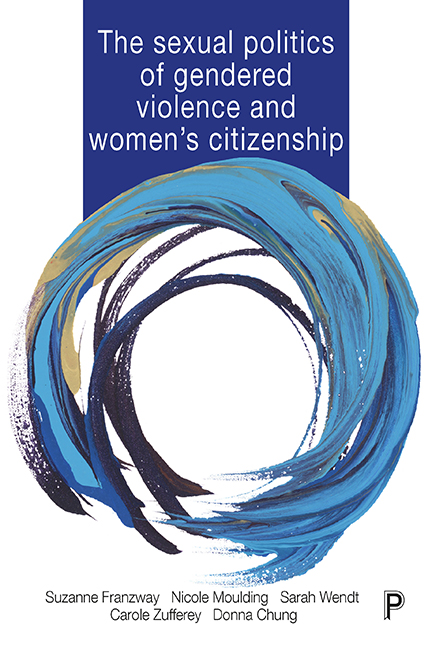Book contents
- Frontmatter
- Contents
- List of tables and figures
- Notes on authors
- Acknowledgements
- one The sexual politics of gendered violence and women’s citizenship
- two Problems of citizenship, violence and gender
- three Challenges of researching gendered violence
- four Living the connected effects of violence
- five Gendered violence and the self
- six Re-engaging lives
- seven Campaigns for women’s freedom from violence
- eight Transforming sexual politics
- References
- Index
three - Challenges of researching gendered violence
Published online by Cambridge University Press: 13 April 2022
- Frontmatter
- Contents
- List of tables and figures
- Notes on authors
- Acknowledgements
- one The sexual politics of gendered violence and women’s citizenship
- two Problems of citizenship, violence and gender
- three Challenges of researching gendered violence
- four Living the connected effects of violence
- five Gendered violence and the self
- six Re-engaging lives
- seven Campaigns for women’s freedom from violence
- eight Transforming sexual politics
- References
- Index
Summary
Introduction
Investigating gendered violence involves a host of challenges, from safety concerns to the ethical questions associated with asking women to recall, relate and relive experiences that often remain highly distressing for many years after. Accordingly, it is imperative that research is designed well so that women and researchers feel and remain safe, emotional distress is minimised and the benefits of participation outweigh the costs. In this chapter, we elaborate on the design of the study, linking this with the conceptual framework for the research that was laid out in the previous chapter. We also consider some of the challenges we faced, such as recruitment issues, dealing with interdisciplinary differences in the team and managing vicarious trauma for research staff. We then consider some of the strengths of the methodology and methods used, as well as some of the limitations.
Conducting and participating in gendered violence research
Taking part in research into gendered violence might be thought of as inevitably upsetting for women who have had these experiences. While some women did experience distress at recounting the impact of violence on their lives, many women also reported that they found participation helpful and even therapeutic. UK sexual violence researcher Liz Kelly (1988) reported similar experiences from the women who participated in her seminal research into sexual assault. Women described as acknowledging and reassuring the opportunity to tell their stories and the experience of being listened to by someone who was supportive but not charged with ‘helping’ them. This aspect of doing research into gendered violence is sometimes overlooked. As discussed in the previous chapter, intimate partner violence (IPV) and its impact on women's lives occurs within a politics of ignorance (Tuana, 2006). Many women experience denial and lack of acknowledgement of violence and its effects from partners, family and friends, with some women even blamed for their partners’ behaviour. In this context, being invited to tell one's story to help increase understanding and improve community responses to violence can be affirming and validating. Many women were not only motivated for themselves, but also by the desire to help other women, challenging assumptions of women in IPV as powerless victims.
- Type
- Chapter
- Information
- Publisher: Bristol University PressPrint publication year: 2018

